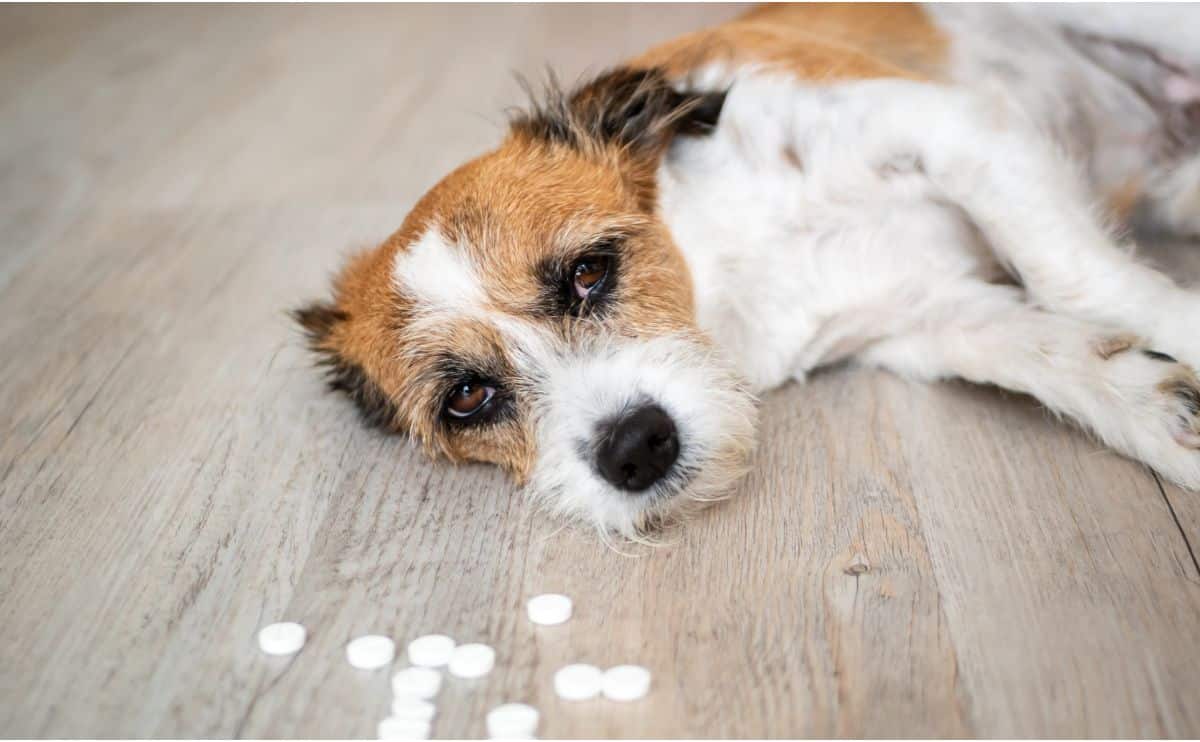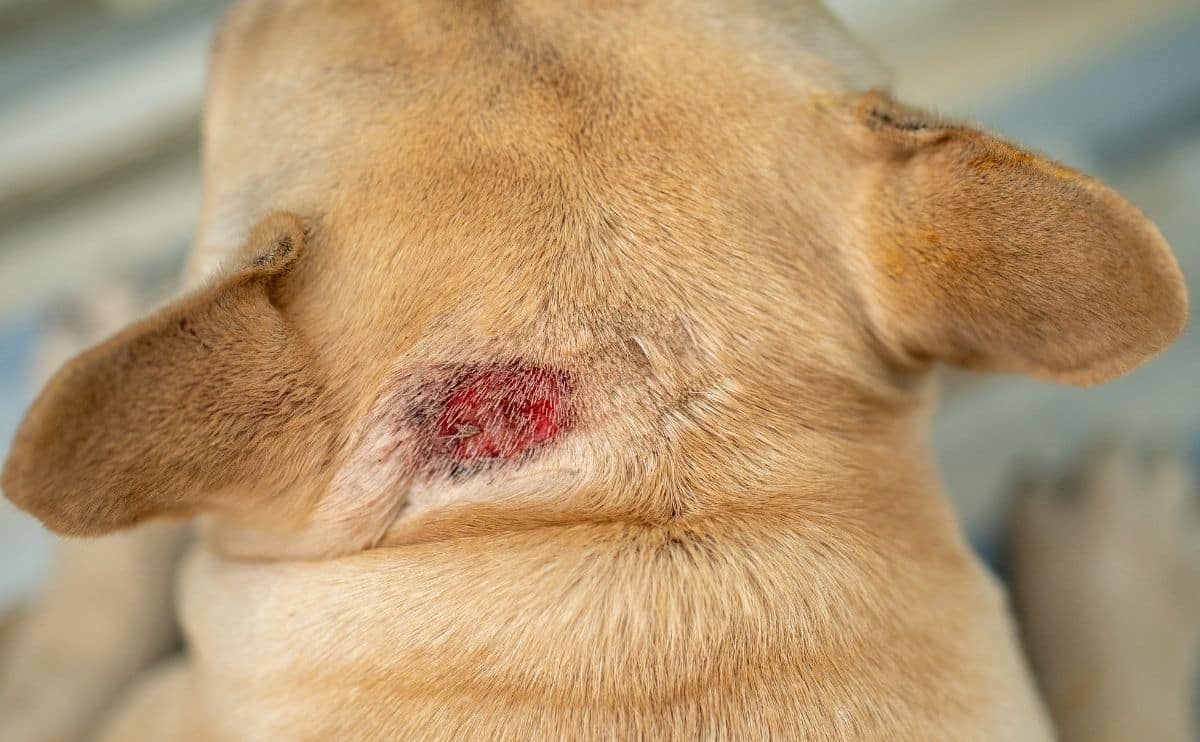Watch Out For These Symptoms Of Dog Poisoning
When you purchase through links on our site, we may earn a commission. Here’s how it works.

Did your dog eat something they shouldn’t have? If you see these dog poisoning symptoms, you need to act fast. When it comes to life-threatening situations, every minute counts, and we all want the same thing – your dog to live. So read our dog poison symptoms carefully and be prepared in case your dog is suffering. It’s better to learn the signs of poisoning in dogs now before it’s too late.
Table of Contents
Important
If you believe your dog may be poisoned, stop reading this and contact your vet now! If you cannot reach your vet, contact the Pet Poison Helpline at 1-855-764-7661 or use our “Ask A Vet” feature to chat with a professional and get help 24 hours a day, 7 days a week.
Signs & Symptoms Of Poisoning In Dogs
Many different types of dog poisoning. Overall, if you are afraid your dog has been poisoned, look out for these visible signs to watch for.
- Vomiting
- Diarrhea
- Seizures
- Blood in the stool
- Lethargy
- Loss of appetite
- Bruising
- Nosebleeds
- Irregular heartbeat
- Inability to urinate
If your dog is suffering from one of these things, you should seek help immediately. Dog food poisoning symptoms may be similar to the general poisoning symptoms.
Symptoms Of Dog Poisoning
Beyond the more noticeable signals are some more serious, longer-term issues to keep an eye out for. Below are the different types of symptoms associated with dog poisoning.
Irregular Heart Beats
Dogs with irregular heart rhythms and cardiac symptoms have most likely gotten into a medication or plant. This includes jimson weed, kalanchoe, milkweed, mountain laurel, and oleander.
Kidney Failure
Antifreeze poisoning can cause your dog to go into kidney failure and can result in an inability to produce urine. Plants can also cause kidney damage. These types of plants include dieffenbachia, Easter lily, caladium, pigweed, and philodendron. Learn more about signs of plant poisoning in dogs in our guide to poisonous plants.
Liver Damage
Medications like aspirin or ibuprofen and plants such as tansy ragwort or rattlebox can cause liver damage. Find out what over-the-counter medicines are okay for dogs (and which are potentially toxic).
Loss Of Blood
If your dog has bruising, blood in their stool, nosebleeds, or anemia, they have most likely gotten into rat or mouse poison. However, if they’ve gotten into your garden or kitchen and overeaten onion, garlic, sweet clover, or bracken fern, they could also suffer from anemia. In either case, they can suffer from severe bleeding and could even die.
Neurological Symptoms
Dogs suffering from seizures and other neurological symptoms have possibly ingested one of many things. This list is long and includes the following:
- antidepressants
- alcohol
- aspirin
- drain cleaners
- dishwasher soap
- gasoline
- marijuana (learn more about dogs and marijuana)
- flea repellents
- tobacco
- furniture polish
- strychnine.
Exposure to, or bites from, poisonous animals can cause dogs to seize as well. These animals include certain breeds of snakes, spiders, toads, and frogs. Specifically, you’ll want to look out for Florida marine toads, Coral snakes, Colorado River toads, and brown recluse spiders. Read about how a venomous snake bite nearly killed my dog.
Plants can cause neurological symptoms as well, including buckeyes and horse chestnuts.
Stomach Concerns
Garbage, lead paint, English ivy, English holly, chocolate, medications, poinsettia, iris, Chinaberry, daphne, and pokeweed are dangerous to dogs. Digesting these substances can result in gastrointestinal symptoms such as diarrhea, loss of appetite, and vomiting.
Dog Cyanide Poisoning Symptoms
Cyanide is a naturally occurring chemical found in some plants. It has also been used in conventional warfare. Symptoms of cyanide poisoning in dogs include difficulty breathing, bright red gums and tongue, dilated pupils, vomiting, seizures, and collapse. If you suspect your dog has been poisoned with cyanide, it is important to seek veterinary care immediately. It can be fatal if not treated right away.
What Foods Are Dangerous To Dogs?
Year after year, dogs eating toxic human foods is one of the top causes of dog poisoning. It’s impossible to watch your dog 24/7, but if you know there’s something your dog shouldn’t get into, you should put it up high in a cupboard, or somewhere else you know they can’t reach. Dogs eating chocolate or grapes is preventable. Be cautious of where you place your food, and check out our extensive list of foods dogs should not eat.
To learn more about the dangers of dogs eating chocolate, watch the video below.
Our First-Hand Experience
We all know our dogs get into things they aren’t supposed to. So, it’s our job to keep hazards away from them. But sometimes accidents happen to even the best dog parents. One of our team members shares her brush with a scary situation and how it panned out.
Our King Charles Cavalier Spaniel Lexie decided it was a good idea to eat an alcohol prep pad (why that would be tasty, who knows?). I found the evidence of the package ripped up on the sofa and called the 24/7 ASPCA poison control hotline immediately. They responded right away, asked a few questions about what happened, when, and how much was consumed.
Then the vet explained that dogs process rubbing alcohol similar to how humans process liquor; it’s not toxic in small amounts but can make them a little impaired or drowsy if they consume too much. The vet also said Lexie might appear to be “drunk” (i.e., sluggish or sleepy). However, if she starts to exhibit signs of more elevated alcohol poisoning (like vomiting), the vet instructed us to give her soft, white bread to absorb the alcohol (and help push the pad out of her system). Once the alcohol was out of her system, Lexie was back to her happy, sweet self.
– Sadie C., Canine Journal
Does Pet Insurance Cover Pet Poisoning?
Yes, pet insurance covers accidental pet poisoning, which can cost anywhere from $250 to $6,000+. So if your pet is insured and eats something they shouldn’t, such as chocolate, antifreeze, toxic plants, and xylitol, it should be eligible for coverage by most providers. However, you must have your pet insured, and all applicable waiting periods must have passed for coverage to apply. You can learn more about the best pet insurance companies in our article and get a quote below.
Tips To Keep In Mind
Program your vet’s phone number into your phone and the emergency vet. You should also have it written down in a place you can find easily at home.
If you think your dog has poison symptoms, don’t hesitate to call the vet or poison control hotline. Explain your situation. Ask them for advice on what steps to take next.
If your dog may be experiencing dog poison symptoms, be sure to read our article on treating a poisoned dog. Remember, it’s important to learn these things before your dog is in distress so that you can act quickly and efficiently if trouble arises.



